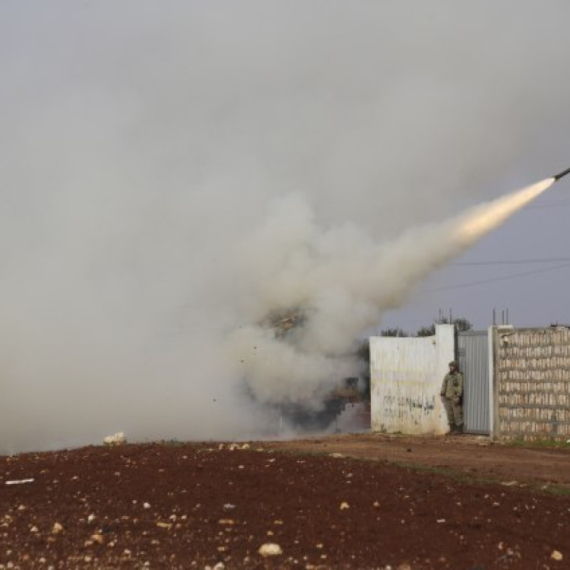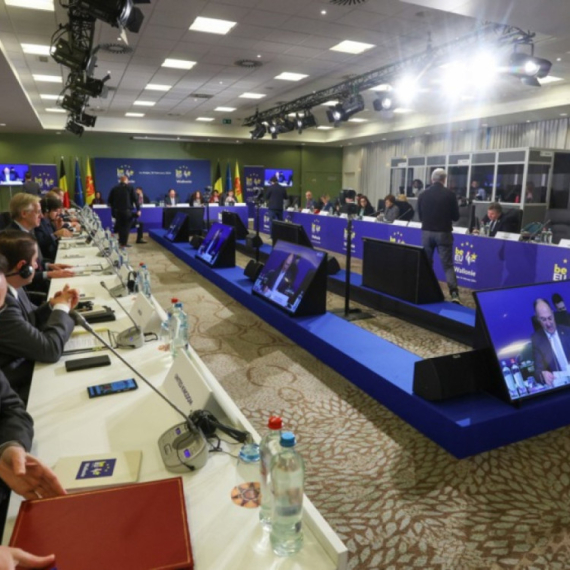Moscow slams U.S. arms delivery
The U.S. decision to send arms to Kosovo is like trying to “extinguish fire with kerosene,” says Russia’s representative to NATO.
Saturday, 29.03.2008.
11:02

The U.S. decision to send arms to Kosovo is like trying to “extinguish fire with kerosene,” says Russia’s representative to NATO. “I don’t know if it’s possible to extinguish fire with kerosene. There are a lot of weapons in Kosovo, now it’s a matter of removing them, not delivering them,” said Dmitry Rogozin, after an informal Russia-NATO Council meeting in Brussels at ambassador level. Moscow slams U.S. arms delivery Rogozin stressed that if the U.S. decision was implemented, there could be “dozens of injured, and hundreds killed” in any future troubles. The Russian diplomat said that the decision of U.S. President George Bush’s administration contravened Security Council Resolution 1244, that should lead to the disarmament of armed Albanian factions, and commits KFOR to limiting the influx of weaponry to Kosovo. He said that the decision was particularly astounding coming in the wake of “the bloody events in Kosovska Mitrovica.” He also reacted to a statement by NATO Secretary General Jaap de Hoop Scheffer in the Financial Times concerning “Russia’s aggressive rhetoric,” stressing that the remark was inappropriate and inaccurate. “What’s better: aggressive rhetoric or aggressive policy,” asked Rogozin at a press conference, adding that Russia was not forming military bases anywhere in Mexico, was not inviting Ireland or Iceland into its military bloc, and was not making anti-missile defense systems abroad, and “does not recognize the independence of parts of a sovereign state, for example, Corsica, or the Basque country.” Russia simply calls things by their name, said the Russian NATO representative, stressing that it would continue to do so “regardless of who was in charge in the Kremlin.” “Russia’s rhetoric will always be honest and frank,” he said. Rogozin said that the theme of the U.S. missile shield in Europe would be discussed at the April 4 Russia-NATO summit. “The U.S.’s missile shield defense plans are primarily aimed at the defense of the U.S., which plans to bring down virtual missiles in European airspace. It’s strange that European countries are showing such enthusiasm, given that they might fall on their cities and villages,” the Russian diplomat pointed out.
Moscow slams U.S. arms delivery
Rogozin stressed that if the U.S. decision was implemented, there could be “dozens of injured, and hundreds killed” in any future troubles.The Russian diplomat said that the decision of U.S. President George Bush’s administration contravened Security Council Resolution 1244, that should lead to the disarmament of armed Albanian factions, and commits KFOR to limiting the influx of weaponry to Kosovo. He said that the decision was particularly astounding coming in the wake of “the bloody events in Kosovska Mitrovica.”
He also reacted to a statement by NATO Secretary General Jaap de Hoop Scheffer in the Financial Times concerning “Russia’s aggressive rhetoric,” stressing that the remark was inappropriate and inaccurate.
“What’s better: aggressive rhetoric or aggressive policy,” asked Rogozin at a press conference, adding that Russia was not forming military bases anywhere in Mexico, was not inviting Ireland or Iceland into its military bloc, and was not making anti-missile defense systems abroad, and “does not recognize the independence of parts of a sovereign state, for example, Corsica, or the Basque country.”
Russia simply calls things by their name, said the Russian NATO representative, stressing that it would continue to do so “regardless of who was in charge in the Kremlin.”
“Russia’s rhetoric will always be honest and frank,” he said.
Rogozin said that the theme of the U.S. missile shield in Europe would be discussed at the April 4 Russia-NATO summit.
“The U.S.’s missile shield defense plans are primarily aimed at the defense of the U.S., which plans to bring down virtual missiles in European airspace. It’s strange that European countries are showing such enthusiasm, given that they might fall on their cities and villages,” the Russian diplomat pointed out.



































Komentari 13
Pogledaj komentare